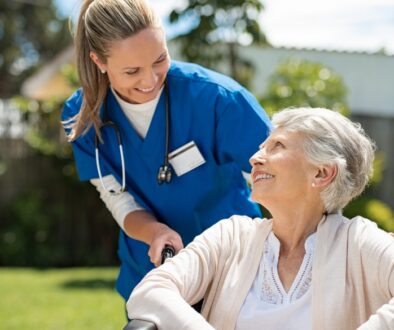Balancing Work & Elder Care Through the Coronavirus
While much attention has been paid to the difficulties of parents trying to balance their professional responsibilities with home-tutoring children whose schools have, there are also millions of people who are juggling work and elder care in the midst of the Coronavirus outbreak, leaving many feeling overwhelmed.
Some are attempting to work from home with a sick mother or father who needs attention. Some have stopped allowing professionals health aides to enter their parents’ residences for fear of exposure to coronavirus. Many are just operating under incredible stress, unable to communicate with relatives who are in lockdown in nursing homes and assisted living facilities.
For these working daughters and sons, setting boundaries, employing technology and routines, asking for flexibility (and some forgiveness), and managing well-being will be critical. And while many of these recommendations are similar to what working parents can and should do, others are unique to working sons and daughters.
First, set your parents up for success. Your elderly parents are probably as stressed as you are right now. Even if they are not watching or listening to the relentless stream of bad news, they are most certainly picking up on your mood and those of others around them. They might also be concerned about your well-being — they are parents after all — and not wanting to be a burden. Do what you can both to communicate with them and to create a calm, predictable day for them so that you can carve out time to get your work done.
If they don’t understand exactly what is going on, explain it in simple terms. If you live with them, find time to connect each morning before you start working. If they live elsewhere and you can’t visit for fear of spreading the Coronavirus or because their senior living facility is not allowing visitors, consider using alternative technologies, such as voice or video calls or conferences, to stay in touch. For some, the phone is challenging due to cognitive decline, dexterity issues, or loss of hearing or sight. But products like Consumer Cellular’s Grandpad or the Amazon Echo may help because you or the manufacturers’ tech support team can remotely assist with set up and operation.
Routines are also important. Just as many working moms and dads are trying to institute modified school-day schedules from home, working daughters and sons should do their best to create structure for their elderly parents too. Those in private care homes might already have this. But you can build a daily schedule in your own home, too. If your parent knows when he or she can expect to get dressed, take medicine, eat meals, and engage in certain activities, such as watching TV or exercising, he or she will be less likely to get worried and disrupt your work. Beyond routines, try to view activities from your parent’s point of view.
If you are going to have your parents watch a show while you work, is the volume adjusted for them to hear? Is the remote within reach? Do they have water or a snack? If they like to read and can operate a device, can you give them a Nook or other tablet so they have a variety of materials to choose from? Most importantly, do they have a way to call for you if they do need you?
Second, establish boundaries. Let your elderly parents know that even though you are home and life may seem different, your work responsibilities have not changed. Unless they just recently retired, your parents did not have access to laptops, smartphones, and videoconferencing when they were employed so the idea of conducting meaningful work outside the office might be a confusing concept.
If your parents live with you, provide them with visual clues that remind them when you cannot be disturbed: you are in your home office with the door shut, you have headphones in, or you are at your computer, for example.
Minimize interruptions by discussing what warrants one and what does not. If your parents are incontinent, you might want them to call for you no matter what you’re doing if they need to use the bathroom. If they are a fall risk, you might decide that any time they go up or downstairs they should let you know.
If your parents live elsewhere and are able to operate a telephone, make sure they know that you are still working through the crisis and remind them when you are available to take calls, as well as what warrants an emergency interruption and what does not. Make sure that siblings and paid caregivers know these things, too.
Of course, if your parents have dementia or any other cognitive decline, understand that they may not be able to honor these boundaries, in which case you can only gently repeat them as needed.
Third, over-communicate with coworkers and managers. While this might be standard advice for anyone working remotely, it is especially important for people with eldercare responsibilities because these activities are often invisible to your colleagues. It is much more common and comfortable for people to talk about their children at work than it is to talk about aging and/or ill parents. So you cannot assume that your boss or peers know or understand your situation.
Eldercare is also highly unpredictable and can therefore be highly disruptive to your workday, especially if you are attending to someone with dementia. So tell your coworkers about your caregiving status and ask for their compassion during this time. If you need to go offline, miss a call, or step away from a web meeting, do it. Then make sure to follow up on what you missed and communicate any updates on your work as soon as you can.
Finally, mind your health. In ordinary times, the words, “You should take care of yourself,” are perhaps the six most annoying words a caregiver can hear. You’re probably well aware that caregivers are more likely than those in the general population to report they are doing a poor to fair job at managing stress and getting enough sleep. What you can’t ever seem to figure out is how or when to do all of that. But, especially during this crisis, your ability to continue to earn a living while caring for your aging parent is contingent on your own well-being. Now is the time to limit your consumption of negative news, stay hydrated, get fresh air, and add meditation, short walks, or yoga to your daily routine. Drinking water is perhaps the simplest thing you can do to take care of yourself. It increases your energy levels by helping blood to transport oxygen and other nutrients to your cells. And walks, meditation and yoga all aid in relaxation which helps you sleep at night.
Know that in the coming days and weeks your efforts to balance elder care and career will be imperfect, and that’s okay. And also know this: when we emerge from this crisis, the role of the family caregiver, providing front-line support to not only children but also our aging citizens, will no longer be invisible.
Keep Up To Date On Neighbor News and Blogs
Find all of The Neighbors of Dunn County’s current news here.
Source: Harvard Business Review




